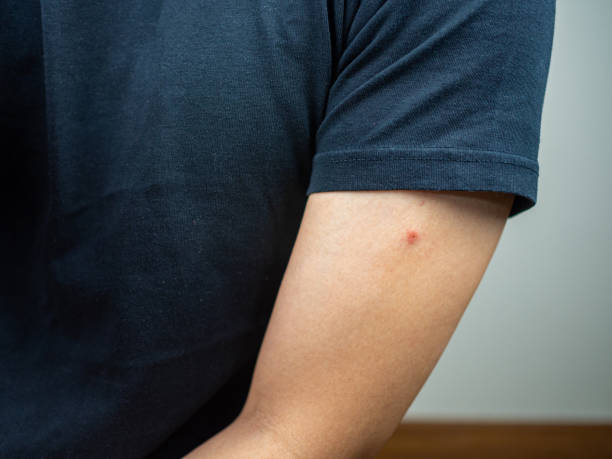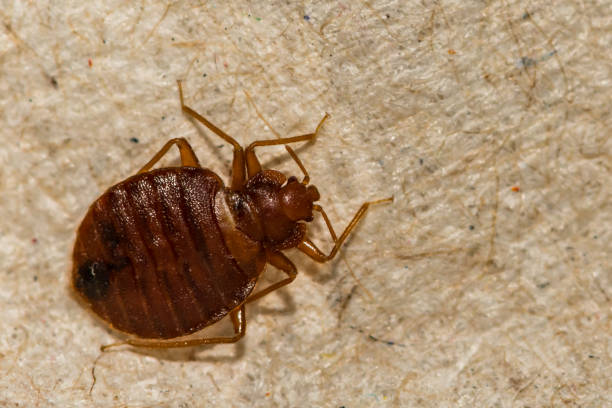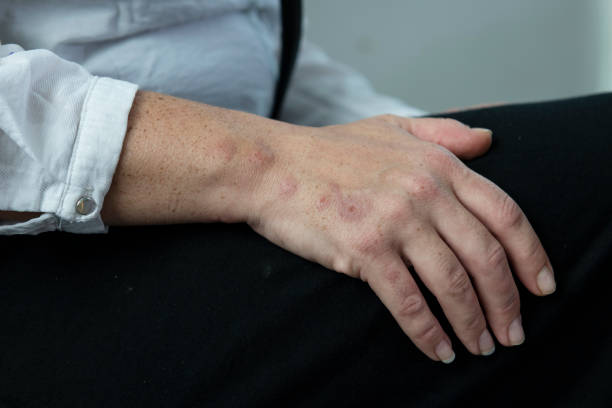Bed bug bites can be reminiscent of mosquito bites. Indeed, it tends to itch a lot. It can be difficult to distinguish the two. Bed bugs also have their preferences. In the same bed, they will therefore generally suck the blood from the body of the occupant who releases the most heat, which is reminiscent of the operating mode of their biting cousins who, for their part, favour the person who releases the heat, odours and CO2. And in appearance, painless red pimples may additionally resemble each other. There is then swelling and redness in the papules which sometimes have a hemorrhagic red dot in their centre or a vesicle of clear fluid.
What especially differentiates them is above all that the traces of bedbug bites are systematically aligned and grouped in the same place on uncovered areas such as the legs, stomach, back or arms. Another difference with mosquitoes is that the bedbug bites on average once a week to feed. Several buttons therefore generally arrive in waves with a lull between two “feasts”. When a bed bug bites, saliva is injected under the skin. This releases an anaesthetic and an anticoagulant which thins the blood to facilitate its aspiration. This is not without causing allergic reactions, hives and severe itching. In addition, this pruritus is more marked in the morning than in the evening.
Other signs than bed bug bites to spot in the environment

Sometimes, we will be able to notice the presence of dead or crushed bed bugs or skin resulting from a moult. The most common clue is, however, small black spots of excrement on bedding. You should therefore not fail to observe the wall carefully, and the corners of the bed structure: seams of the mattress, headboard, box spring, slats. Bed Bugs can cause blood stains when you crush them at night.
What are the risks of getting bitten by these critters?

Fortunately, there is no risk of illness. Indeed, these little animals do not transmit any infectious agent (virus, bacteria, parasite, etc.) during the bite. Pregnant women and weak people can therefore sleep soundly. However, there is an infectious risk. Remember that these bites cause inflammation and intense itching. However, scratching for too long can, for example, cause a staphylococcal infection. You should also not overlook a potential allergic reaction to histamine, a substance released by bedbugs. In addition to skin reactions, there is a risk of oedema or respiratory problems. Antihistamines are then important.
How to relieve bed bug bites?

Of course, to avoid infections, you should avoid scratching even if it itches. To prevent bed bug bites from becoming infected, it is also advisable to take care to clean the wound well to eliminate germs. Here, simply use a Marseille soap or a neutral pH soap and an antiseptic. Preferably, use lukewarm water and let the soap suds dry on the skin for about ten minutes before rinsing off. There are also many basic remedies you can use to treat bed bug bites. This includes baking water paste, toothpaste, lemon juice, calamine, St. John’s wort oil, lavender aspic essential oil, etc.
Against bed bug bites, the best long-term solution is still to eradicate them! To do this, no need for insecticides to carry out the disinfection. Using diatomaceous earth to sprinkle on and leave for a few hours before vacuuming will remove a good deal of it. For clothes and bed linens like comforters, curtains, or rugs, consider freezing for three days to destroy larvae. Otherwise, washing at a minimum of 60 ° C is possible.